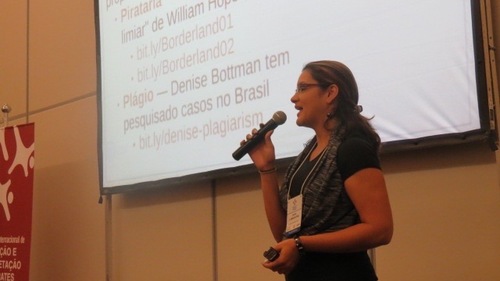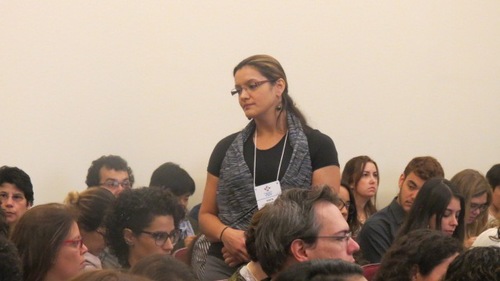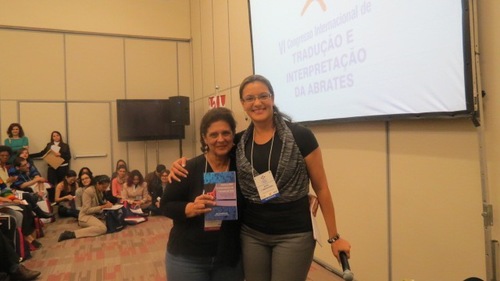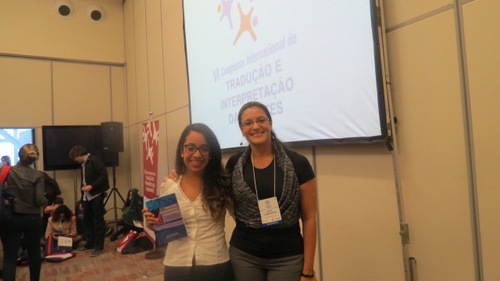Caroline Alberoni
On June 5-7 I attended the 6th International Translators and Interpreters Conference organized by the Brazilian Translators Association (ABRATES), which was held this year at the Rebouças Convention Center in São Paulo. On Saturday (June 6th), the very first day of the event, I had the pleasure of listening to Rafa Lombardino talk about The Role of Translators in the New Digital Publishing Age. She talked about how translators can translate and publish books written by self-published author or material that is already in the public domain.
According to Rafa, if you're interested in being part of the digital publishing age and self-publish your own translations, you must first look for stories that speak to you. Based on that, try to find self-published authors who are interested in having their books available in another language. As an alternative, translators can look for books that are in the public domain―which takes effect in Brazil 70 years after the author's death.
For those who select the first option, the speaker discussed how to negotiate with authors: full rate, reduced rate + royalties (about 20-25% commission on sales), split royalties (40-45% commission on sales) or total release of copyrights. Notwithstanding the negotiation process, it's crucial that translators sign a contract, ideally seeking assistance from an attorney to obtain a draft contract.
During or after the negotiation process, depending on the author's preference, it's important to agree on how the translation will be published. Rafa then talked about self-publishing opportunities: on-demand printed book, digital/electronic book, or audio book. With the first option, books are only printed when a copy is purchased. Some service providers for on-demand books include CreateSpace (Amazon), Lulu.com, and BookBaby. In order to avoid any issues before the book is made available to readers, she suggested that a proofreading copy be ordered. Book covers are something that require special care. Attention must be paid to colors and graphical elements, which cannot be copyright-protected. The advantage of using the second option, the digital/electronic book, is that the unit price can be more affordable, considering lower production costs. Main service providers for electronic books include Kindle (Amazon), iBook (Apple), Google Books, and Smashwords. As for audio books, they're more expensive because they demand more production time. Besides, storytellers with a nice voice must be hired. Some service providers for this format include Audible (Amazon), iTunes (Apple), and LibriVox (public domain). Audio books can also be used a companion product and sold at a discounted price if readers have already bought a copy of the book in another format, or a paperback/ebook can be offered for free to those who have already bought the audio version.
Photo Credit: Elenice Barbosa de Araujo
During the translation process, Rafa suggests that translators create a blog or microsite to document the project―which can also double as a portfolio. After the book is published, she urges translators to brainstorm events, such as an autograph night, to promote the book they translated. Translators should also use social media, while taking in consideration the nature of each channel. Facebook, for example, may be used to post updates to your blog and news related to the project. Due to Twitter restrictions (140 characters), translators can post teasers. Pinterest is good to add photos and images related to the book. And Instagram is ideal for audiovisual material, such as pictures and short videos. You can also write about the book as a guest blogger on someone else's blog or use Wattpad or Medium to make samples available. Another promotion idea is to create a YouTube channel exclusively for your project, where you can have a book trailer, read some fragments, or record interviews.
However, translators must be careful: "Once you post something online, it's out there," Rafa warns, so be careful about the contents you make available on the internet, because there's always a risk it could be pirated or plagiarized.
If you already have followers, the presenter suggested crowdfunding as an option, since it consists on seeking funds from several volunteering financiers in order to achieve a given goal―which in our case would be publishing a book. In Brazil, there's BookStart, as well as Kickstarter, Indiegogo, Crowdfunder, RocketHub, and Crowdrise. You can also offer presents or rewards for those who fund your project.
Once you finally self-publish your own translations, be creative and use your imagination to find ways on how to promote your material!
Caroline Alberoni
is a translator from English and Italian to Brazilian Portuguese. Specialized in IT, marketing, business and law, she has a BA and an MA in Translation Studies and operates Alberoni Translations, a company she runs with dedication, commitment, professionalism and the deepest concern for every client’s linguistic needs.









